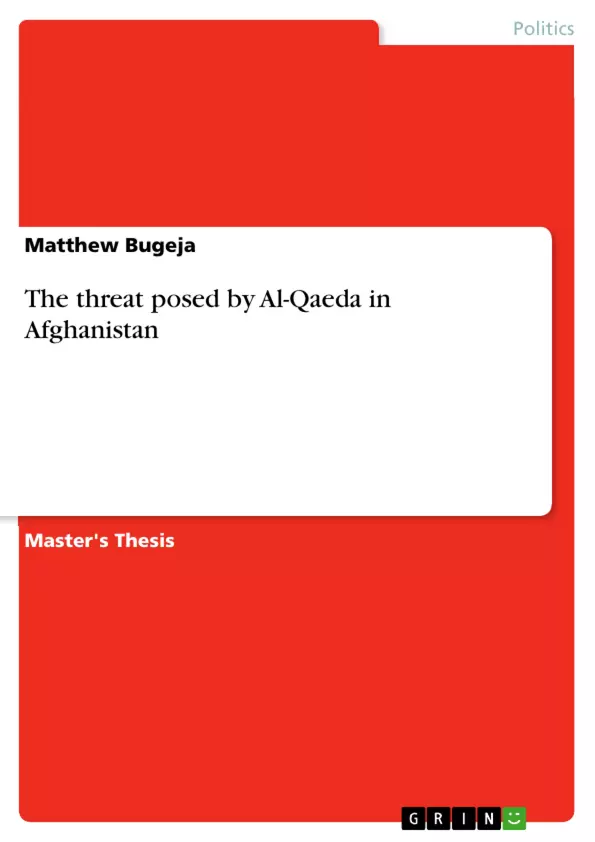This dissertation explore the threats posed by al Qaeda in Afghanistan and whether it is first necessary to stabilize this country in order to eliminate the group. It will be argued that al Qaeda's ideology has now become stronger than its ability to threaten international security; that its aim to become an agent of change within the Muslim world has come to outweigh the threat attributed to it as a conventional, kinetic, terrorist entity. The current instability within Afghanistan is not due to al Qaeda's physical presence there but rather an amalgamation of factors. It will be argued that the U.S.-led invasion in 2001 has contributed to al Qaeda's weakening there but it has not contributed to stabilize Afghanistan itself. The instability in Afghanistan will require a strong, long-term commitment by the international community, while the fight against al Qaeda will require more focus on combating its ideology, and less on military action. Whilst al Qaeda remains an elusive enemy for the West due to its ability to constantly adapt, the international community has failed to adapt adequately to not only combat al Qaeda's ideology, but also to implement the necessary long term strategy that is required to achieve stability in Afghanistan.
Inhaltsverzeichnis (Table of Contents)
- Chapter 1: Introduction
- Methodology
- Chapter 2: Terrorism & Failed States - A review of literature
- Al Qaeda as a specimen of transnational terrorism
- Afghanistan in the context of foreign military intervention
- Nation-building and counterinsurgency
- Chapter 3: Al Qaeda: Origins and Identity
- The Origins of al Qaeda
- The Structure of al Qaeda
- Al Qaeda's Ideology and Recruitment
- A transformative entity
- Chapter 4: Afghanistan: Foreign Intervention & Historical Instability
- Afghanistan as a traditional, tribal society
- The Age of Colonialism
- The Soviet Intervention and Aftermath
- Rise of the Taliban
- Chapter 5: Operation Enduring Freedom
- U.S. position during the Bush Era (2001-2008)
- The Obama Era (2009- Present)
- Nation-building Initiatives and the role of the U.N.
Zielsetzung und Themenschwerpunkte (Objectives and Key Themes)
This dissertation examines the threats posed by al Qaeda in Afghanistan and whether stabilizing the country is a prerequisite for eliminating the group. It argues that al Qaeda's ideology has gained more strength than its ability to threaten international security, emphasizing its goal of driving change within the Muslim world over its conventional terrorist activities.- The impact of al Qaeda's ideology on international security
- The relationship between al Qaeda's presence and instability in Afghanistan
- The effectiveness of the U.S.-led invasion in weakening al Qaeda and stabilizing Afghanistan
- The need for long-term international commitment to stabilize Afghanistan
- The importance of combating al Qaeda's ideology through non-military means
Zusammenfassung der Kapitel (Chapter Summaries)
Chapter 1: Introduction
This chapter introduces the research topic, outlining the dissertation's scope and methodology.Chapter 2: Terrorism & Failed States - A review of literature
This chapter examines the existing literature on terrorism and failed states, focusing on al Qaeda as a transnational terrorist organization and Afghanistan's experience with foreign military intervention. It explores the challenges of nation-building and counterinsurgency in the context of failed states.Chapter 3: Al Qaeda: Origins and Identity
This chapter traces al Qaeda's origins, analyzing its structure, ideology, and recruitment methods. It explores the group's evolution and its potential to become a transformative entity within the Muslim world.Chapter 4: Afghanistan: Foreign Intervention & Historical Instability
This chapter examines Afghanistan's historical context, focusing on its traditional tribal society, colonial experiences, the Soviet intervention and its aftermath, and the rise of the Taliban.Chapter 5: Operation Enduring Freedom
This chapter analyzes the U.S.-led military intervention in Afghanistan, exploring the U.S. position during the Bush and Obama administrations. It examines nation-building initiatives and the role of the United Nations in stabilizing the country.Schlüsselwörter (Keywords)
This dissertation explores the intersection of terrorism, failed states, and ideological influence, focusing on al Qaeda, Afghanistan, and the challenges of counterinsurgency, nation-building, and international security. Key themes include the evolution of al Qaeda's ideology, the impact of foreign intervention on Afghanistan's stability, and the need for a multi-faceted approach to combating terrorism.Frequently Asked Questions
What is the primary threat posed by al-Qaeda in Afghanistan today?
The dissertation argues that al-Qaeda's ideology has become a stronger threat than its physical presence, aiming to be an agent of change in the Muslim world.
Is stabilizing Afghanistan necessary to eliminate al-Qaeda?
While physical presence is a factor, the study suggests that military action alone cannot eliminate the group without addressing its adaptable ideology and long-term stability in the region.
How did the 2001 U.S. invasion affect al-Qaeda?
The invasion contributed to weakening al-Qaeda's physical infrastructure in Afghanistan but did not successfully stabilize the country itself.
Why is Afghanistan considered a "Failed State" in this context?
The context of foreign interventions, historical tribal structures, and the rise of the Taliban have contributed to a cycle of instability and weak central governance.
What should be the focus of the international community?
The study emphasizes a shift toward combating al-Qaeda's ideology through non-military means and a long-term commitment to nation-building and counterinsurgency.
- Quote paper
- B.A. (Hons), M.A. International Relations Matthew Bugeja (Author), 2011, The threat posed by Al-Qaeda in Afghanistan, Munich, GRIN Verlag, https://www.grin.com/document/274356



